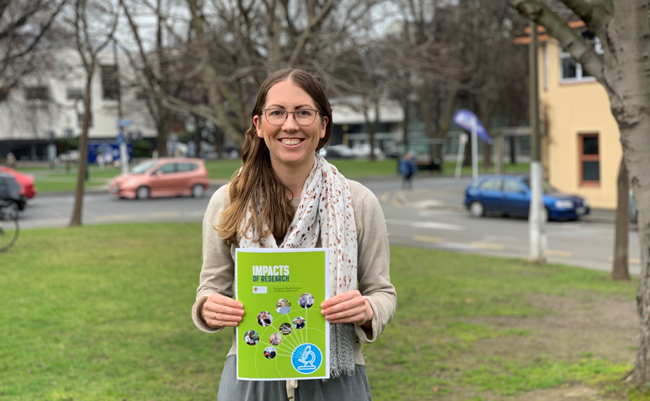
Maria Larcombe, the lead author of a new booklet highlighting how health research changes the world.
How health research changes the world is the focus of a new booklet from the University of Otago Division of Health Sciences.
While most people can reference headline-making world-changing health research, like the discovery of penicillin or x-ray technology, in fact myriad smaller examples of research are changing the world every day.
Lead author of the Impacts of Research booklet and University of Otago research fellow Maria Larcombe says it is becoming ever-more important for these research impacts to be communicated.
An increased emphasis on research impact, both in New Zealand and internationally, has been driven by funders and providers wanting to see what the research they fund is achieving, she says.
"Research can have impact in all sorts of ways, big and small. What research impact really means is achieving real-world change."
“Research funders are looking for a return on their investment, and for money invested in research to be used in the most relevant way. I think the importance of research having impact has always been integral to research production. However, we are in an environment now where we must be able to articulate and evidence impact to a greater degree.”
Ms Larcombe says research impact can be defined as “the difference research makes in the world, largely outside of academia”. That impact doesn't need to be headline-grabbing.
“Research can have impact in all sorts of ways, big and small. What research impact really means is achieving real-world change.”
Her role was established in 2018 to encourage and support research impact in the Division of Health Sciences, and to ensure researchers learnt how best to tell their research impact stories. She says her hope is that, by highlighting what can and has been achieved, those about to embark on new research can gain valuable insight into how to plan for and achieve research impacts.
“The examples we've included in this booklet cover quite a broad range. There are examples of changing policies, commercialising research by creating a patentable product, building capability in the research workforce, and improving health and well-being in certain populations. All of these examples show how research can really change lives.”
Dr Michele Coleman, Division of Health Sciences Research and Development Manager, says there can be great benefits to researchers if they are effective at planning for and articulating impact.
“Most Health Sciences researchers go into their careers with a real desire to make a difference. What this project aims to do is help them to maximise and articulate the difference their research makes.”
The Impacts of Research booklet includes eight case studies from across the university's Division of Health Sciences. It can be viewed here.
Story by Craig Borley (Communications Adviser, Division of Health Sciences).
